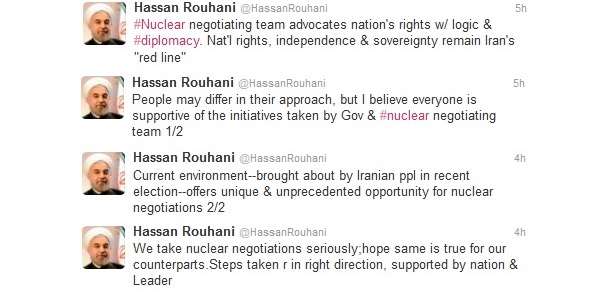
Ahead of new diplomatic talks, top U.S. and Iranian officials are scrambling to push back hardliners opposed to a nuclear deal. Tehran and the world’s six major powers are scheduled to meet from November 7 to 8 for the second time since President Hassan Rouhani took office.
The previous negotiations, held onOctober 15-16 in Geneva, prompted a backlash from conservatives in both the United States and Iran. Some Iranian conservatives doubted U.S. honesty in negotiations. “We must never compromise with the United States," former nuclear negotiator and 2013 presidential candidate, Saeed Jalili, told crowds at a rally commemorating the 1979 takeover of the U.S. Embassy in Tehran on November 4. Many U.S. lawmakers vocally opposed compromise on sensitive issues like Iran’s right to enrich uranium.
In an October 28 meeting with lawmakers, Rouhani basically appealed for more domestic support for his diplomatic agenda. “Stronger support inside will empower the government to proceed with the campaign against sanctions,” said the president.
On November 3, Supreme Leader Khamenei boosted Rouhani’s efforts by publically endorsing the president’s negotiating team, led by Foreign Minister Mohammad Javad Zarif. “They have a difficult mission, and no one has the right to weaken an official who is doing his job,” said Khamenei. The supreme leader’s office also posted a decades-old photograph of Rouhani (center) with Khamenei (left) emphasizing the administration’s loyalty to the Islamic revolution, including the negotiators.
President Obama has faced the same challenge. His administration tried to convince U.S. lawmakers to hold off on new Iran sanctions and give diplomacy a chance. Dozens of senators and representatives had called for tightened sanctions ahead of the last round of talks in Geneva. But a top U.S. negotiator, Undersecretary of State Wendy Sherman, said “This is a time for a pause in new sanctions” in an interview with the Voice of America on October 25.
On October 31, the White House sent a high-level delegation to Capitol Hill to address lawmakers’ concerns and make the case for delaying sanctions. Secretary of State John Kerry, Vice President Joe Biden and Treasury Secretary Jack Lew held a closed-door session with key Republican and Democrat senators. Senator Dean Heller (R-NV) said Kerry and Lew “were making the argument [for delaying new sanctions], and frankly they’re doing a pretty good job of it,” according to Politico.
The following are remarks by top U.S. and Iranian officials who pressed back against hardliners in the run-up to new talks.
Iran
Supreme Leader Ayatollah Ali Khamenei
“No one should see our negotiating team as compromisers. They are our own children and children of the revolution. They have a difficult mission, and no one has the right to weaken an official who is doing his job.
Nov. 3, 2013 in remarks to students
President Hassan Rouhani
In a November 3 cabinet meeting, President Rouhani emphasized the “unique and unprecedented opportunity” for diplomacy brought about by his election. He noted that “people may differ in their approach” to negotiations but argued that Zarif and his team are advocating for Iran’s rights. Rouhani’s office tweeted translations of his remarks.

Rouhani also thanked Khamenei for his support in a November 3 tweet.

The United States
Under Secretary for Political Affairs Wendy Sherman
“We think that this is a time for a pause [in new sanctions], to see if these negotiations can gain traction… Congress has its prerogatives. We don’t get to control Congress, but we are having very serious discussions. We work as partners with Congress. They’ve been very effective partners as we’ve tried to approach this negotiation. We need them to continue to be effective partners to reach a successful conclusion, and I have trust that they will be.”
Oct. 25, 2013 in an interview with the Voice of America
State Department Spokesperson Jen Psaki
“We have conveyed that any congressional action should be aligned with our
negotiating strategy as we move forward. So while we understand that
Congress may consider new sanctions, we think this is a time for a pause, as
we asked for in the past, to see if negotiations can gain traction.
negotiating strategy as we move forward. So while we understand that
Congress may consider new sanctions, we think this is a time for a pause, as
we asked for in the past, to see if negotiations can gain traction.
“None of those sanctions have been pulled back, as we’ve discussed.”
Oct. 25, 2013 in a press briefing
National Security Spokesperson Caitlin Hayden
“The window for negotiation is not open-ended, and if progress isn't made, there may be a time when more sanctions are, in fact, necessary. We have always said that there would be no agreement overnight, and we've been clear that this process is going to take some time.
“We feel that it’s important that any new proposals take into account the progress we’re making diplomatically and leave open the flexibility. There’s always time for sanctions in the future as needed, but this is an ask we’re making to Congress now.”
Oct. 25, 2013 to reporters at the White House
